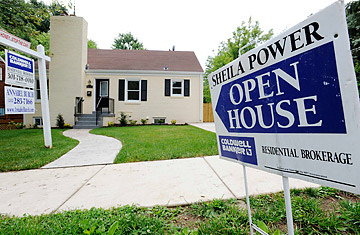
A sign announces an open house for a home for sale in Silver Spring, Maryland.
Spring is typically the season when people shop for houses. Many families like to complete their home purchase by the end of the summer so as to not uproot their children during the school year. And let's face it: houses just look more enticing when flowers are out. But the real estate bust and economic downturn have made the past few housing hunting seasons rather slow. Some buyers have waited on the sidelines hoping prices had further to drop.
This year looks to be different. Already, falling interest rates, an improving economy and a last bit of economic stimulus are helping the housing market stage a revival. In April alone, sales of existing homes jumped 23% from a year ago, according to the trade organization National Association of Realtors. Sales of new homes rose even faster, up 48% from a year ago. What's more, a growing number of economists believe the three-year plunge in housing prices is at an end.
"Units, volume and sales price are up on all fronts," says real estate broker Todd Hetherington, who is based in Alexandria, Va. "Houses that are priced well are getting multiple offers in the first week."
For now, though, housing prices, like everything else, remain rocky. According to the S&P/Case-Shiller nationwide index, home prices fell 3.2% in the first quarter of 2010, down from the already low levels where they stood at the end of 2009. And home prices may stay down for a little longer. The continued recent slide in the stock market is hurting consumer confidence and likely to make some people pause before buying a house. Foreclosures aren't helping the housing market either. The government's home-loan-modification programs have helped keep a relatively small amount of home owners out of foreclosure. But more repossessed homes are now starting to land on the market, driving up the number of houses for sale and holding down prices. In addition, some economists are concerned that the expiration of an $8,000 tax credit for homebuyers, which essentially ended in April, will hurt home sales. Indeed, the Mortgage Bankers Association said last week mortgage applications for new home purchases fell to the lowest level since 1997. Lastly, mortgage credit remains tight, making it hard for some prospective home buyers to qualify for a loan.
"We think the tax credit has dragged a lot of house sales forward, and we think we are going to pay for it," says Jay Brinkmann, the chief economist for the Mortgage Bankers Association. He expects home sales to drop 5% in the fall of 2010.
Nonetheless, a growing number of economists believe this spring could end up being the start of a sustained rebound in the housing market. The biggest driver of that rebound will likely be interest rates. Though rates were expected to rise this summer, the continuing problems in Europe are driving down rates in the U.S., which is still seen as a safe haven for investors. The result is that mortgage rates have fallen to their lowest point in a year and are expected to continue to drop through the summer. In general, for every percentage-point decline in mortgage rates, houses effectively become 10% cheaper.
A recent study of 92 economists by financial-products firm MacroMarkets found that on average housing prices are expected to drop slightly in 2010 and begin rising again next year. That means that for the first time in years someone who buys a house this spring will most likely see their home appreciate in the next year. And rising housing prices, just like falling ones, tend to feed on themselves.
"Low interest rates will be a powerful incentive," says William Hummer, chief economist for Wayne Hummer Investments. "People who want to be home owners will get back into the market."
